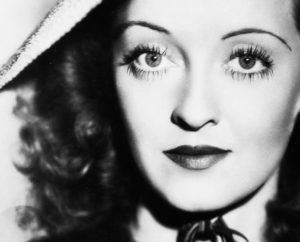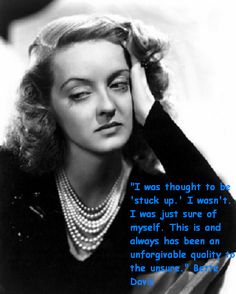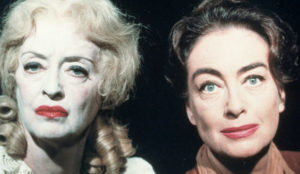




If Bette Davis had been a ship, she’d have be a polar icebreaker. If Bette Davis had been a dog she’d have been a bull mastiff.
If Bette Davis had been a flower I’d say she’d be the thorniest rose, you get the idea.
‘The Lonely Life’ by Bette Davis introduced me to the famous actress in her own words, through her own eyes. Her personality comes through so strongly through the pages that it’s possible to get a glimpse of the actress herself and form a few opinions on her.

Famous “Bette Davis” eyes.
Opinions on Bette Davis are not scarce. Her famous feuds and boil-over temper were legendary, yet her close friends also knew a woman who was driven to succeed not just as an actor but as a person, within her own limits. Bette begins the book by claiming all faults as her own, all mistakes laid at no other door than her own. This is commendable, but as she lays out the brief setting of her childhood it’s easy to see how her temperament was formed. She was throwing formidable tantrums with no discipline when she was a toddler, she held total reign over her mother while courting attention from her highly intelligent, completely aloof father.
“Daddy,” as Bette called him was a cold man trapped by his own walls of intellect and criticism of every living thing. The dog, a vicious chow who bit everyone, was the only being Bette ever remembered her father showing affection for. Bette refers to her austere Yankee upbringing many times with a mixture of pride and as a label to explain herself. It’s easy to see how a child in that environment could be driven, always driven to look for proof that she was good enough. No not good enough, the best. And that plain and simple is what drove Bette Davis.

She had four marriages and several children, won two Oscars and had multiple awards and nominations throughout her lifetime. Bette wrote this book in 1962, very defensive about herself, her personality, her failures as she saw them; and most of all how much men contributed to her ire. I can’t entirely blame her, I’d HATE to be treated as men treated women in the 50s, and if I were a true artist as Bette strove to be and was trained in the theatre; I’d certainly hate being shoehorned into confinement and virtual slavery as the studios of old Hollywood used to do.
So, she fought. About everything. In her eyes it was always a matter of taste, a matter of art or wanting the picture to be the best it could be: but read a few outside interviews and the famous Davis temper seems childish and ego-driven with a penchant for hatred of being wrong, rather than ‘for the art.’ I certainly became bored with her litany of abuse towards men, but at least it was all very lucidly written and expressed in her classic way. Everything is in absolutes. Bette was haughty and austere, her sentences overwhelmingly go like this: “I’ve ALWAYS hated lemonade,” “I’ve NEVER condone sleeping in,” “I’ve ALWAYS found starlets to be trite,” “I’m SIMPLY BORED by pettiness.” I made all these up but her attitude is all to easy to ape.

Of Bette and Joan’s infamous feud nothing is written by Bette here. Only respect for a fellow actor.
Still, ‘The Lonely Life’ has a sense of humor, never absurdist, and is true to character, and for that honesty I applaud Bette Davis’ courage to be herself. Yes, courage it must have taken to live in her time period and remain true to herself. She wasn’t afraid to play ‘ugly’ or ‘old’ roles and often argued for realism in her parts. Bette Davis is not a sympathetic character, she made her own obstacles perhaps time and time again; but she could no more change who she was than a cat could change it’s ways. She really was who she was. It is not a riveting read, and her imperious manner bores at times; but it is fairly thorough as far as autobiographies go.
I found the inscription on her gravestone to be especially fitting: “Bette Davis. She did it the hard way.”











